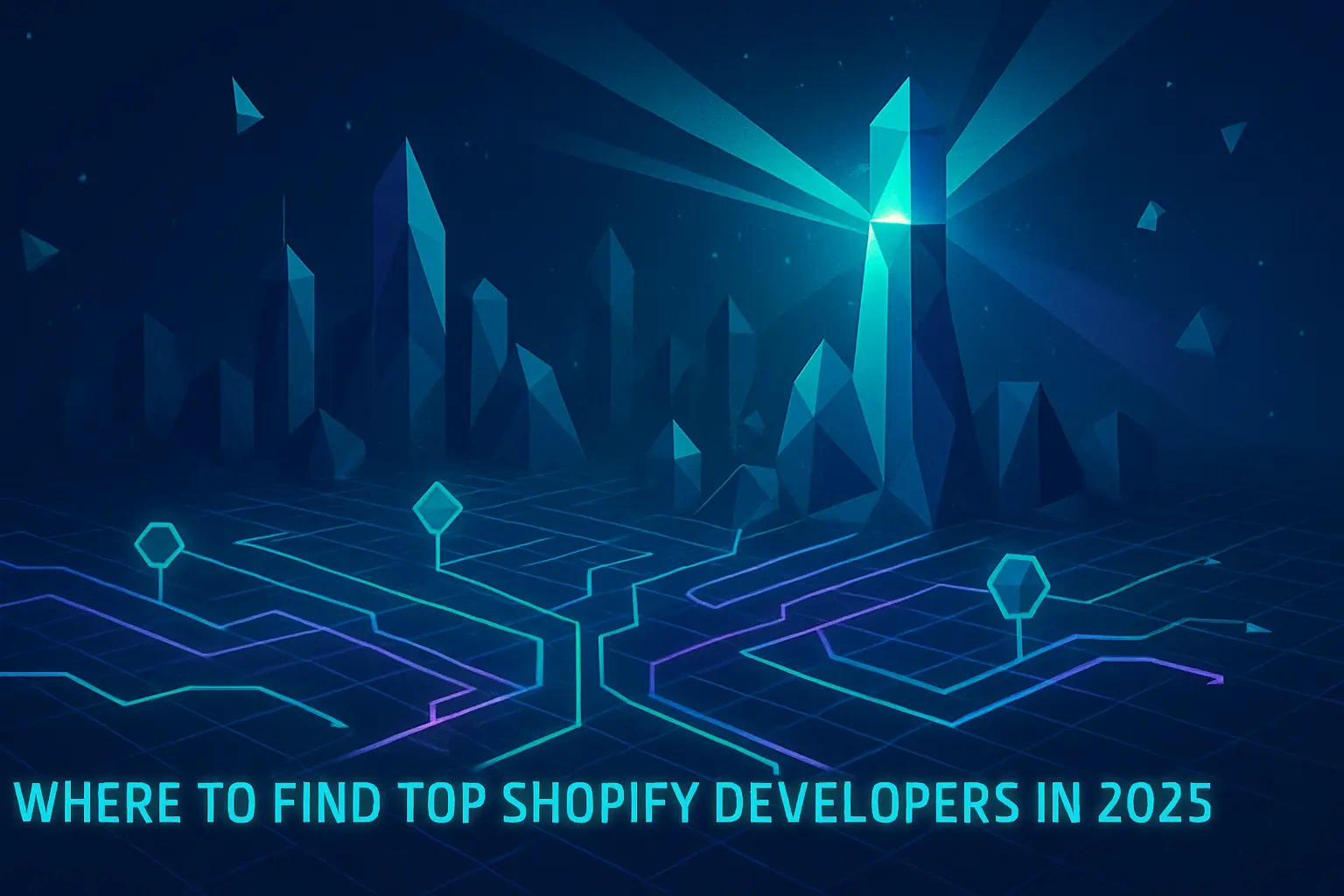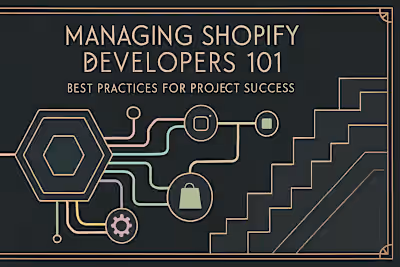Where to Find Top Shopify Developers in 2025: A Complete Guide

Where to Find Top Shopify Developers in 2025: A Complete Guide
Beyond Traditional Job Boards: Tapping into Niche Communities
The Power of Freelance Marketplaces with Vetted Talent
Engaging in Official and Unofficial Shopify Communities
Leveraging Professional and Developer-Centric Networks
Utilizing LinkedIn for Targeted Searches and Outreach
Exploring Developer Hubs like GitHub
Assessing and Vetting Potential Candidates
Reviewing Portfolios for Relevant Experience
The Importance of Referrals and Testimonials
Making Your Final Decision
References
Where to Find Top Shopify Developers in 2025: A Complete Guide
Finding the right Shopify developer is critical to the success of your e-commerce business. With over 2.5 million live stores on the platform as of early 2025, the demand for skilled developers is higher than ever. This guide will explore the most effective channels to source top talent.
Once you have a pool of candidates, the next step is crafting a compelling job description to attract them. And if you want to bypass the lengthy search process, you can find and hire a top Shopify developer directly on Contra.
The e-commerce landscape has evolved dramatically. Store owners need developers who understand modern customer expectations. They need experts who can build fast, mobile-friendly stores that convert visitors into buyers.
But here's the challenge: great Shopify developers are in high demand. They're often already working on exciting projects. So how do you find them? And more importantly, how do you convince them to work with you?
This guide breaks down the most effective strategies for finding Shopify development talent in 2025. We'll explore both traditional and innovative approaches. You'll learn where these developers spend their time online and how to approach them effectively.
Beyond Traditional Job Boards: Tapping into Niche Communities
While general job boards have their place, finding specialized Shopify talent often requires a more focused approach. Niche communities and platforms are where dedicated experts gather, share knowledge, and look for their next challenge.
Think about it this way. Would you look for a sushi chef at a general restaurant job board? Probably not. You'd go where sushi chefs congregate. The same principle applies to Shopify developers.
These specialized communities offer several advantages. First, the developers there are genuinely passionate about e-commerce. They're not just looking for any coding job. They specifically want to work with Shopify.
Second, you can see their expertise in action. Many developers share tips, answer questions, and showcase their work in these communities. This gives you insight into their knowledge level before you even reach out.
The Power of Freelance Marketplaces with Vetted Talent
Explore platforms that specialize in connecting businesses with pre-vetted freelance developers. These platforms often have a rigorous screening process, ensuring you're choosing from a pool of high-quality, experienced professionals, which saves you time and reduces hiring risk.
The best freelance marketplaces don't just list anyone who claims to be a developer. They test candidates' skills. They verify past work. They check references. This vetting process does the heavy lifting for you.
Consider what happens when you post on a general job board. You might get hundreds of applications. Most won't have the specific Shopify experience you need. You'll spend hours sorting through resumes, only to find a handful of qualified candidates.
Vetted marketplaces flip this equation. Instead of sorting through unqualified applicants, you browse pre-qualified professionals. Each developer has already proven their skills. You can view their past projects, read client reviews, and often see their rates upfront.
Some platforms even offer project matching services. You describe your needs, and they suggest developers who fit. This personalized approach saves even more time. It's like having a recruiting assistant who already knows the Shopify ecosystem.
Engaging in Official and Unofficial Shopify Communities
The official Shopify Community forums and the Shopify Developer Community are excellent places to find active developers. Additionally, platforms like Reddit's r/shopify and various LinkedIn groups host vibrant communities where developers discuss technical challenges and opportunities.
These communities serve as virtual water coolers for Shopify professionals. Developers share their latest discoveries. They troubleshoot complex problems together. They celebrate wins and commiserate over challenges.
The official Shopify forums are particularly valuable. Developers who contribute there demonstrate real expertise. They're not just talking about Shopify; they're actively solving problems. You can see their communication style and problem-solving approach in real time.
Reddit's r/shopify offers a more casual environment. Developers here often share honest opinions about tools, techniques, and industry trends. It's less formal than official forums, which can lead to more candid discussions.
LinkedIn groups provide a professional middle ground. Members use their real names and professional profiles. This accountability often leads to higher-quality discussions. Plus, you can easily check a developer's background before reaching out.
When engaging in these communities, don't just post job listings. Participate in discussions. Ask thoughtful questions. Share your own insights about e-commerce challenges. This approach builds relationships before you need to hire.
Leveraging Professional and Developer-Centric Networks
Your professional network and developer-specific platforms are invaluable resources for finding high-caliber candidates who may not be actively looking for a new role but are open to the right opportunity.
The best developers often aren't actively job hunting. They're busy working on interesting projects. But they might consider a new opportunity if it's compelling enough. This is where professional networks shine.
These passive candidates are often the most valuable. They're employed because they're good at what they do. They're selective about new opportunities. When you connect with them through professional networks, you're reaching talent that job boards miss.
Developer-centric platforms offer unique advantages. They showcase actual work, not just resumes. You can see code quality, project complexity, and collaboration skills. This transparency helps you identify truly skilled developers.
Utilizing LinkedIn for Targeted Searches and Outreach
LinkedIn is more than just a resume site; it's a powerful search tool. Learn how to use advanced search filters to identify developers with specific Shopify experience, review their work history, and conduct targeted outreach. Look for developers who are active in relevant groups like 'Shopify Store Owners, Experts, and Developers'.
Start with LinkedIn's advanced search features. Filter by skills like "Shopify development," "Liquid," or "Shopify Plus." Combine these with location preferences and experience levels. This narrows your search to relevant candidates quickly.
Pay attention to developers' activity levels. Active LinkedIn users who share Shopify-related content show ongoing engagement with the platform. They're more likely to respond to thoughtful outreach.
When reviewing profiles, look beyond job titles. Read project descriptions carefully. A developer might have extensive Shopify experience even if their title doesn't mention it. Many full-stack developers work with Shopify regularly.
Craft personalized outreach messages that show you've done your homework. Reference specific projects from their profile. Explain why your opportunity aligns with their experience. Generic messages get ignored, but thoughtful ones start conversations.
Consider using LinkedIn's InMail feature for direct contact. While it requires a premium account, it allows you to message developers you're not connected with. The investment often pays off when sourcing specialized talent.
Exploring Developer Hubs like GitHub
GitHub is where developers showcase their work. Search for repositories related to Shopify themes, apps, or Liquid. A developer's activity, contributions to open-source projects, and the quality of their code can be strong indicators of their expertise and passion.
GitHub profiles reveal what resumes can't. You see actual code, not just claims about coding ability. Look for developers who maintain Shopify-related repositories. Check their commit history to gauge consistency and dedication.
Open-source contributions are particularly telling. Developers who contribute to Shopify tools or themes demonstrate both skill and community spirit. They're solving real problems for other developers. This mindset often translates to excellent client work.
Pay attention to documentation quality. Good developers write clear README files. They explain their code's purpose and usage. This documentation skill is crucial for maintaining Shopify stores long-term.
Star counts and forks indicate a project's value to others. While not everything needs to be popular, well-received projects suggest the developer creates useful solutions. Check the issues section too. How do they respond to bug reports or feature requests?
Don't overlook developers who contribute to others' projects. These contributions show collaboration skills. They're comfortable working with existing codebases - essential for Shopify customization work.
Assessing and Vetting Potential Candidates
Once you've identified potential developers, the next step is to evaluate their skills and experience effectively to ensure they are the right fit for your project.
Vetting developers properly saves time and money down the road. A bad hire can derail your project, damage your store's performance, or create technical debt. Thorough assessment prevents these costly mistakes.
The vetting process should evaluate both technical skills and soft skills. Technical expertise gets the job done. Communication skills and reliability ensure smooth collaboration. Both are essential for project success.
Remember that Shopify development requires specific knowledge. General web developers might struggle with Liquid templating or Shopify's API limitations. Your vetting process should confirm Shopify-specific expertise.
Reviewing Portfolios for Relevant Experience
A strong portfolio should showcase a variety of projects that demonstrate the developer's skills in theme customization, app integration, and problem-solving. Look for live sites you can test for performance and responsiveness.
Start by looking for diversity in project types. Has the developer worked on different industries? Can they adapt themes for various business needs? Versatility suggests they can handle your unique requirements.
Test the live sites thoroughly. Check page load speeds using tools like Google PageSpeed Insights. Browse on mobile devices. Add products to cart and go through checkout. These real-world tests reveal code quality.
Look for complex customizations, not just basic theme installations. Custom product configurators, advanced filtering systems, or unique checkout flows demonstrate advanced skills. These projects show problem-solving ability.
Pay attention to design implementation accuracy. Compare live sites to any design mockups shown. Pixel-perfect implementation indicates attention to detail. This precision matters for professional e-commerce stores.
Check how recently projects were completed. Shopify evolves rapidly. Developers using outdated methods might struggle with modern requirements. Recent projects suggest current knowledge.
The Importance of Referrals and Testimonials
Don't underestimate the power of word-of-mouth. Ask for referrals from your professional network and check for testimonials or case studies from a developer's past clients. This can provide valuable insight into their work ethic, communication skills, and reliability.
Referrals from trusted sources carry significant weight. When a colleague recommends a developer, they're putting their reputation on the line. This personal endorsement often indicates exceptional work.
Ask your network specific questions about developers they've worked with. How was communication during the project? Did they meet deadlines? How did they handle unexpected challenges? These details matter as much as technical skills.
Client testimonials reveal the full project experience. Look for mentions of problem-solving, flexibility, and post-launch support. The best developers don't just build and disappear. They ensure long-term success.
Case studies provide even deeper insights. They show the developer's process from problem identification to solution implementation. Look for clear explanations of challenges faced and how they were overcome.
Don't hesitate to contact references directly. Prepare specific questions about your concerns. Most clients are happy to share experiences if it helps another business owner. Their insights can confirm or challenge your initial impressions.
Social proof extends beyond formal testimonials. Check if developers are recommended in Shopify communities. Peer recognition from other developers often indicates genuine expertise.
Making Your Final Decision
After thorough vetting, you'll have a clearer picture of each candidate's capabilities. The final decision should balance technical skills, communication ability, and cultural fit with your team.
Consider conducting a small paid test project before committing to a larger engagement. This approach lets both parties evaluate the working relationship. It's a low-risk way to confirm the developer meets your standards.
Discuss project timelines, communication preferences, and revision processes upfront. Clear expectations prevent misunderstandings later. The best developer relationships start with honest, detailed conversations about how you'll work together.
Remember that finding the right Shopify developer is an investment in your business's future. Take the time to search thoroughly and vet carefully. The effort you put in now will pay dividends through a successful, stress-free development process.
Whether you're building a new store or enhancing an existing one, the right developer makes all the difference. Use the strategies in this guide to find professionals who'll help your e-commerce vision become reality. Your perfect Shopify developer is out there - now you know exactly where to find them.
References
Like this project
Posted Jul 4, 2025
Discover the best platforms and strategies to find and hire expert Shopify developers. Learn where to look, from niche communities to professional networks.









